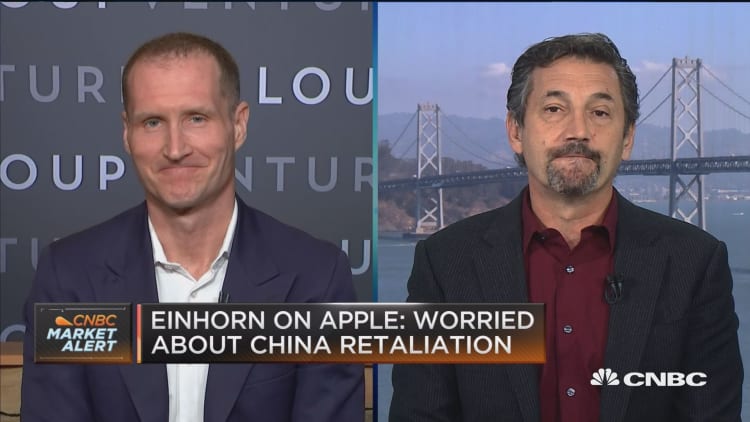
David Einhorn's Greenlight Capital selling its remaining shares is a sign of a "paradigm shift" in which investors are finally seeing Apple as a software and services company, Loup Ventures' Gene Munster told CNBC on Friday.
"We are moving to a new era, which is Apple as a service, and investors, like David [Einhorn], understand that this is coming and are grappling at how to value Apple as a service," Munster said on CNBC's "Closing Bell."
"This is symbolic of what is a shift in investor psychology," he added.
In Einhorn's third-quarter letter to investors, he wrote that Greenlight Capital sold its shares of Apple due to its heightened valuation and fears of Chinese retaliation in response to U.S. tariffs.
Since Greenlight's first purchase of Apple in May 2010, the firm said, its investment earned clients over $1 billion.
"At the end of the day, [David] made some money and wants to bank his winnings here. I don't think the substance of what he said has much merit, around the China stuff; that's a small part of it," Munster said.
Edward Snyder, managing director at Charter Equity Research, said the China threat isn't so much tariffs as it is competition from Chinese companies that may start to erode some high-end handset business, which won't help Apple's stagnating unit sales.
And as the high-end handset market becomes more saturated, Snyder said, he doesn't see another Steve Jobs type coming along to innovate Apple out of its conundrum.
"They are grappling ... with the same problem that all handset companies that have matured and ran out of ideas have done in the past — Motorola, Nokia, Rim. So far I have not heard them articulate a strategy on how they are going to avoid the same thing that happened to those companies," Snyder said in the same "Closing Bell" interview as Munster.
"The future, as they are articulating it now, is a service play, but that doesn't work if you start losing subscribers," he added.
Munster agreed with Einhorn that there isn't "as much upside in Apple shares in the next seven years as the past seven years," but he said there is no reason to be concerned.
"There is substantial upside going forward, because I think as more investors start to understand this is ... a different Apple today than it was over the past eight years, that will be positive for the multiple," Munster said.


